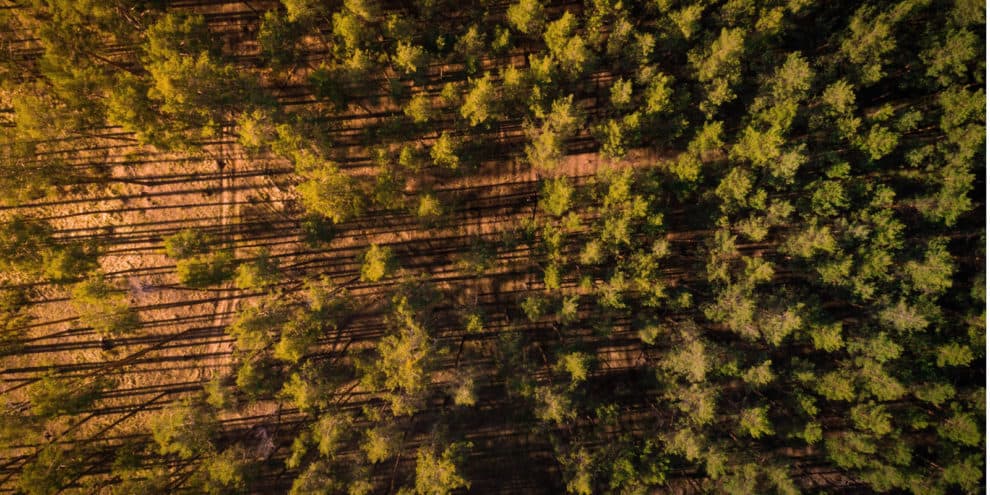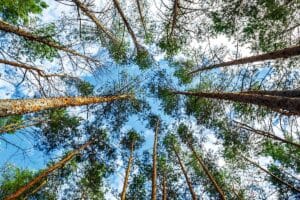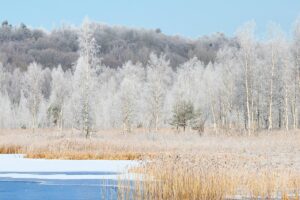What does the phrase “Good Timberland Investment” actually mean? It is a common descriptive phrase that helps illustrate a feature of land for sale. All of us in the land brokerage business use this phrase (or many similar ones) regularly, because more times than not, there will be a timberland component on most rural land properties. However, just because a property has trees on it doesn’t always mean that it is a “Good Timberland Investment.”
The purpose of this article is to expand on the phrase “Good Timberland Investment,” to show that there are various levels of this feature on most rural land properties. It will help you, as the buyer, to have a better understanding of this concept when deciding which rural property is the right one to buy for you and your family. Some properties have BETTER “Good Timberland Investment” features than others. It all depends on what you want to do with the property. As many of my great former forestry professors at Auburn University would always say, “It all depends on the landowner’s objectives.”
Example Tracts
Example 1: You have a 100 acre tract that was clear cut 20 years ago and was not replanted, but was left to grow back naturally. It probably has some good pine products such as pulpwood, chip and saw, and maybe a scarce sawtimber size tree perhaps close to a drain or bottomland area. Unless there was a tremendous pine seed bed leftover from the previous timber stand, the pines that were left to grow naturally are probably scattered in pockets throughout the 100 acres. In the remaining areas of the growing space, there is young (probably pre-merchantable to pulpwood size) hardwoods such as sweetgum, various oak species, beech, hickory, and various other type species, depending on where the property is located.
Example 2: Compare this stand to a 100 acre tract across the street that was clear cut, sprayed, burned, and replanted. It was thinned at age 15 and is ready to be thinned again. After a few more years, the tract will be ready to clear cut and the entire process will start again. On this management plan, it will have produced revenue at 3 different intervals.
These two examples are extremes of each other, but illustrates the point of one property that has underutilized its growing space, in the natural stand, versus the other property that has fully utilized its growing space, with the planted pines. I have seen both property types described as a “Good Timberland Investment.” There can also be “Good Timberland Investment” properties that have nice mixed and mature pines and hardwoods, which are very valuable. If your number one objective is to have the BEST “Good Timberland Investment,” in this scenario you would want to purchase the stand of planted pines or the mixed and mature hardwood and pine stand, giving you the chance to have a “GREAT Timberland Investment”.
Example 3: I have also seen this phrase used in describing clear cut land for sale. Clear cut land is seen by some as a blank canvas and is very attractive to a certain buying pool, particularly if a buyer wants to plant pines and establish a plantation.
Depending on the buyer, any one of these 3 types of tracts can be very appealing. Of course, these are 3 very separate and distinct property types. I used three such extreme examples to help illustrate this point. Of course, most properties are not so extreme in nature and if the property is large enough, could very well have all three examples on one property.
If you are looking for an immediate return on your investment, I would suggest buying a tract with an established stand of timber that has enough current timber volume that it could be immediately thinned or clear cut. However, if your main objective is to find hunting land for sale that can also be used for recreational purposes, and timber is not that much of a priority, then perhaps you may be more interested in the tract like the first example. These types of properties, in general, depending on where they are, are somewhat less per acre. If you are not concerned with an immediate return, but are looking more long term with your investment and not wanting to spend as much as the other two example properties, a tract that has been clear cut could be a very good option for you. Whether you are looking to purchase a property for the very first time or if you have owned property for many years, purchasing a clear cut property would be something to strongly consider if your objectives are more long term. Generally speaking, their prices are less per acre and the buying pool is considerably less, which means the opportunity for getting a better value in the dirt may be a better possibility.
There are many decisions to be made when purchasing the right property for you. Cost, size, location, utilization, and special features such as creeks, pasture, etc. are just a few of the many factors that go into such a big decision. In terms of maximizing the likelihood of buying the BEST “Good Timberland Investment” property, one of the biggest factors a buyer needs to keep in mind is TIME: How soon would you want to harvest? How often are you looking to generate revenue from your timber? How long do you think you may want to keep your property? Other factors to consider when trying to maximize the BEST Timberland Investment are soil type, site index, and proximity to as many mill locations as possible! You may see some of the highest quality trees of various species on a tract of land, but if the market for that particular product is too far away to haul to, then it doesn’t matter how nice the tract is.
These are just some things to think about when determining which timberland investment is right for you. An experienced and licensed land agent, as well as a Registered Forester, can help you navigate to find which property is the BEST “Good Timberland Investment” for you.
This content may not be used or reproduced in any manner whatsoever, in part or in whole, without written permission of LANDTHINK. Use of this content without permission is a violation of federal copyright law. The articles, posts, comments, opinions and information provided by LANDTHINK are for informational and research purposes only and DOES NOT substitute or coincide with the advice of an attorney, accountant, real estate broker or any other licensed real estate professional. LANDTHINK strongly advises visitors and readers to seek their own professional guidance and advice related to buying, investing in or selling real estate.










Add Comment